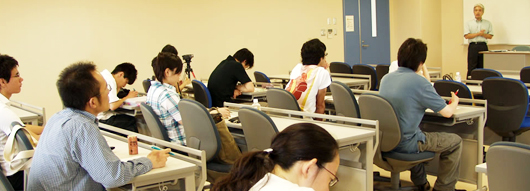



General Outline
The goal of the Public Economics Program is to train students so that they acquire skills in:
1. analyzing, explaining and evaluating various policy issues in tax system, social security system, local public finance, and other areas of public policies, based on clear understanding of economics; and 2. designing and implementing public policies to improve the quality of our life under the resource constraint of our society.
The Public Economics Program is a master program consisting of two-year program and one-year mid-career program. In the two-year program, we train students who intend to work as professional policy analysts and policy makers in, for example, the national government, local governments, NGOs, NPOs, research institutes, and international organizations.
In the one-year mid-career program, we target mid-career people who have working experience in some public policy issues and hope to brush up their skills in policy analysis and policy making.
The Master of Public Policy(Public Economics) will be awarded to the students who successfully complete at least 44 credits of graduate study and meet other requirements.
General Outline of the Curriculum
Economics has become an indispensable tool for public policies, but students have to study economics systematically in order to become capable of using economics as a tool for policy making. Thus, we adopt a curriculum for the students to study it step-by-step. In the first semester of the first year, the students of both two-year program and one-year program have to take "basic subjects" in microeconomics, macroeconomics, econometrics, and public economics. All of these are compulsory courses that every student of the Public Economics Program is requires to complete in order to graduate and all these courses are quite intensive. After finishing these "basic subjects", students are ready to choose courses of their interest, out of a large variety of "applied subjects" and case studies. They are also required to take some "cross-program subjects".
For students enrolled in two-year program, we require them to take a special course called "Consulting Projects". In "Consulting Projects", students are asked to submit a paper on some policy issue to a client outside the university, for example, a government agency, a local municipality, or a think-tank. These clients send evaluation report on the papers by the students to the university. Thus, the students can have a quasi-working experience as a policy consultant and this experience is expected to be very useful for them to become a good policy analyst.
Faculty Members

